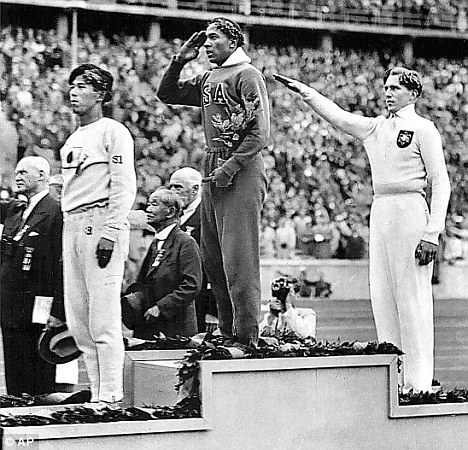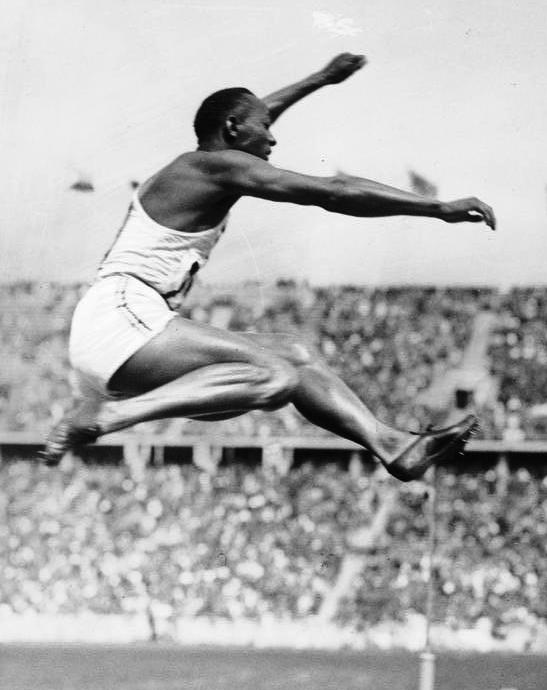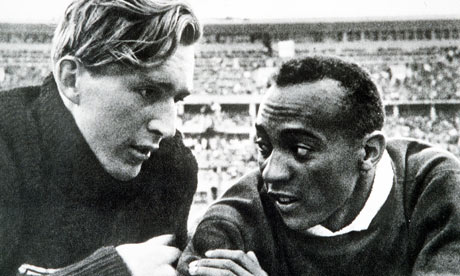JESSE OWENS AND AMERICAN RACISM

The Olympian Jesse Owens is a powerful figure in American history. He is not only famous for his incredible physical feats in the 1936 Olympic Games (winning four gold medals and breaking two world records). But he did so as a black man at an incredibly racist time period in history. The Olympic Games in Germany were said to be Hitler's chance to showcase the superiority of the German Master Race. The common story is that Owens' victory was a giant slight for Adolf Hitler, who believed blacks to be a sub-human race. Yet the real story is perhaps a bit more nuanced than that. Albert Speer wrote that Hitler "was highly annoyed by the series of triumphs by the marvelous colored American runner, Jesse Owens. People whose antecedents came from the jungle were primitive, Hitler said with a shrug; their physiques were stronger than those of civilized whites and hence should be excluded from future games." Anspach, Emma; Almog, Hilah (2009). "Hitler, Nazi Philosophy and Sport". Duke.edu. Retrieved March 23, 2014. [1]
Yet in some ways, Owens actually received far more racist treatment back home in America than he did in Nazi Germany. While America celebrated Owens' victory in the face of the Fuhrer - it seems that America did not reward their own hero that well upon his return to the states.
So were the achievements of Owens a triumph against Nazi Germany? Or a triumph against the racism of Segregation Era America as well? We will explain more below:
Jesse Owens was born in 1913 in Alabama, the son of a sharecropper and the grandson of slaves. He was a frail child, who was often sick from his battles with chronic bronchial congestion and pneumonia. Still, he was expected to work, and at the young age of seven he was picking up to 100 pounds of cotton a day to help his family put food on the table. Therefore, his later physical achievements in life represent tremendous strength and will power over the health challenges he faced as a child.
It was in High School, in Cleveland Ohio, that he quickly made a name for himself as a nationally recognized sprinter, setting records in the 100 and 200-yard dashes as well as the long jump. After graduating High School, Owens enrolled at The Ohio State University ,where he continued to flourish as an athlete. And yet despite being a star athlete for Ohio State, as an African American, he was forced to live off campus and was not allowed to eat with whites on campus. So even before Jesse ever attended the 1936 Olympic Games, Jesse had already lived a lifetime of racism in his own home country, America.

Now in 1935, he already made history as an athlete. In one spring afternoon, he beat three world records and tied for another. For most athletes this would be the accomplishment of a lifetime. Yet for Owens, this was merely the appetizer for his more historical success in the 1936, German Olympic Games.
The Olympics were a big deal for Nazi Germany. This was their chance to showcase the accomplishments of their society to the world. The Nazis even innovated a few traditions that were not originally a part of the Greek Olympics, such as the tradition of running with the torch. The 1936 Olympic games in Berlin were also the first to be broadcast on television, though only to local audiences. Yet the radio broadcasts reached 41 countries around the world. So this was an event that commanded the attention of the masses. The Germans also decided to outdo the Los Angeles games of 1932, and they built a 100,000 seat track and field stadium.
Owens received a rather interesting reception when he first arrived to Germany. According to fellow American athlete James LuValle, who won bronze in the 400 meters, Owens arrived in Berlin to a throng of fans, many of them young girls, yelling "Wo ist Jesse? Wo ist Jesse?" Many of them had come with scissors and had begun snipping at Owens' clothing, forcing him to retreat back onto the train. After that, when Owens left the athletes' village, he usually had to go with some soldiers to protect him. [2]
As a striking contrast from the segregation he grew up with in America, Owens was permitted to stay in the same facilities as the rest of the athletes at the Olympic Village on the Western edge of Berlin.
Now the common story about the games themselves is that Hitler was so overcome with rage upon seeing Owens achieve victory, that he left the stadium in a fit of anger. However, there are some accounts that contradict this story. Historians have noted that Hitler may have left the games at this time due to looming rain clouds which may have postponed the games. This happened well before Owens was to compete, but has largely come to be known as the "snub". [3]
Owens also has his own account of events: "Hitler had a certain time to come to the stadium and a certain time to leave. It happened he had to leave before the victory ceremony after the 100 meters. But before he left I was on my way to a broadcast and passed near his box. He waved at me and I waved back. I think it was bad taste to criticize the 'man of the hour' in another country." [4]
In a 2009 interview, Siegfried Mischner, a German journalist, claimed that Owens carried around a photograph in his wallet of the Führer shaking his hand before the latter left the stadium. Owens, who felt the newspapers of the day reported 'unfairly' on Hitler's attitude towards him, tried to get Mischner and his journalist colleagues to change the accepted version of history in the 1960s. Mischner claimed Owens showed him the photograph and told him: "That was one of my most beautiful moments." Mischner added that the photograph "was taken behind the honour stand and so not captured by the world's press. But I saw it, I saw him shaking Hitler's hand!" According to Mischner, "the predominating opinion in post-war Germany was that Hitler had ignored Owens, so we therefore decided not to report on the photo. The consensus was that Hitler had to continue to be painted in a bad light in relation to Owens." [5]
Also, in 2014, Eric Brown, a British fighter pilot and test pilot, the Fleet Air Arm's most decorated living pilot, independently stated in a BBC documentary "I actually witnessed Hitler shaking hands with Jesse Owens and congratulating him on what he had achieved."[6] Additionally, an article in The Baltimore Sun in August 1936 reported that Hitler sent Owens a commemorative inscribed cabinet photograph of himself.[7]
It should also be noted that on the first day of the Olympics, Hitler only shook hands with the German victors. But this was a mistake on the part of the Fuhrer. Olympic committee officials told Hitler that he had to either greet every medalist or none at all, so he opted for the latter and skipped all further medal presentations. So the idea that Hitler purposely snubbed the presentation of the medal to Owens may be somewhat of an inaccurate assumption here.
The outcome of the 1936 games was that Germany won the Olympics, but Owens made history by earning four gold medals and breaking two world records. In the long jump event he beat out Germany's star athlete Luz Long, who was the iconic image of the German Master Race: tall, blonde and blue eyed. Yet Owens credits Long for giving him good advice, and the two later became good friends.
Owens said in 1964, Long went to him and told him to try and jump from a spot several inches behind the take-off board. Since Owens routinely made distances far greater than the minimum of 7.15m required to advance, Long surmised that Owens would be able to advance safely to the next round without risking a foul trying to push for a greater distance. On his third qualifying jump, Owens was calm and jumped with at least four inches (10 centimeters) to spare, easily qualifying for the finals. In the finals competition later that day, the jumpers exceeded the old Olympic record five times. Owens went on to win the gold medal in the long jump with 8.06m while besting Long's own record of 7.87m.
Owens said, "It took a lot of courage for him to befriend me in front of Hitler... You can melt down all the medals and cups I have and they wouldn't be a plating on the twenty-four karat friendship that I felt for Luz Long at that moment." Long's competition with Owens is recorded in Leni Riefenstahl's documentary Olympia - Fest der Völker. After the Olympics, Owens and Long even kept up a correspondence with one another until Long died in the war.

[Luz Long and Jesse Owens at the 1936 Olympic Games.]
In the aftermath of the Olympics, Owens was allowed to travel with and stay in the same hotels in Germany as whites, while at the time African Americans in many parts of the United States had to stay in segregated hotels while traveling.
When Owens arrived back in America, there was a New York City ticker-tape parade on Fifth Avenue in his honor. Yet as a black man, he was forced to ride the freight elevator at the Waldorf-Astoria to reach his own reception.
President Franklin D. Roosevelt (FDR) never invited Jesse Owens to the White House following his triumphs at the Olympics games, as he did with other athletes. On this matter, Owens later said "Hitler didn't snub me – it was our president who snubbed me. The president didn't even send me a telegram." [8]
It would be unfair to say that Owens received no fan fair in America - given that a parade was thrown in his honor. Yet after the parade, his treatment was very different from that of his fellow white athletes. He starred in no movies and couldn't make a career out of being a celebrity on predominantly white television. He ended up having to race against horses and dogs for money. Owens said, "People say that it was degrading for an Olympic champion to run against a horse, but what was I supposed to do? I had four gold medals, but you can't eat four gold medals." [9]
Like many other African Americans, he was also forced to use back doors, had to ride in the back of the bus, couldn't eat at restaurants with whites, and lived as a second class citizen. It wasn't long before he had to file for bankruptcy. In 1966 he was successfully prosecuted for tax evasion.
Later in life he did manage to pick himself back up. Perhaps as attitudes towards race changed in the U.S. during the sixties and seventies, he finally started getting the recognition that he deserved. The government appointed him as a U.S. goodwill ambassador. Owens traveled the world and spoke to companies such as the Ford Motor Company and stakeholders such as the United States Olympic Committee. Another interesting fact, is that months before his death in March 31, 1980, he had tried unsuccessfully to convince President Jimmy Carter not to boycott the 1980 Moscow Olympics. He argued that the Olympic ideal was supposed to be observed as a time-out from war and that it was above politics.
So Owen's life and accomplishments are indeed a triumph against racist perceptions. Yet it wasn't merely the racist perceptions of Germany and Adolf Hitler that were challenged, but the racist perceptions in America as well.
RELEVANT SOURCES & ARTICLES
Jesse Owens (Biography)
The 1936 Berlin Olympics (History Learning Site)
Owens Pierced a Myth (ESPN)
When Owens Beat Hitler, and the Olympics Changed
Jesse Owens (Wikipedia)
The Real Story of Jesse Owens and the 1936 Olympics (America Blog)
Jesse Owens (Official Website)
Jesse Owens: Myth and Reality (IHR)
VIDEOS
FOOTNOTES
[1] Anspach, Emma; Almog, Hilah (2009). "Hitler, Nazi Philosophy and Sport". Duke.edu. Retrieved March 23, 2014.
[2] Hodak, George A. (June 1988). "An Olympian's Oral History" (PDF) (Press release). Los Angeles: LA84 Foundation. Amateur Athletic Foundation of Los Angeles. RetrievedSeptember 30, 2015.
[3] Out of the Shadows: A Biographical History of African American Athletes (2006) David Kenneth Wiggins, University of Arkansas Press, p119 ISBN 9781610752954
[4] Owens Arrives With Kind Words For All Officials – The Pittsburgh Press, 24 August 1936. News.google.co.uk. Retrieved on 2011-09-15.
[5] Did Hitler shake hands with black 1936 Olympic hero Jesse Owens? - The UK Mail Online, August 11, 2009 Retrieved on July 29, 2014
[6] Paisley University Library Special Collections - Putnam Aeronautical 1997 at theWayback Machine (archived March 4, 2009)
[7] OWENS WEIGHS HIS PRO OFFERS – The Baltimore Sun, August 18, 1936. Pqasb.pqarchiver.com (August 18, 1936). Retrieved on 2011-09-15.
[8] "’SNUB' FROM ROOSEVELT.". St. Joseph News-Press. 1936-10-16. Retrieved 2015-11-12.
[9] Schwartz, Larry. "Owens Pierced a Myth". ESPN. Retrieved April 30, 2009.